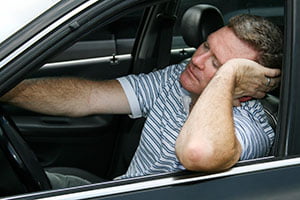 Driving while drowsy is not only dangerous: it can also be deadly. While most people believe that drowsiness is a symptom of just becoming tired, drowsiness is actually an indication that the body has been tired for a while and now the person is minutes away from falling asleep.
Driving while drowsy is not only dangerous: it can also be deadly. While most people believe that drowsiness is a symptom of just becoming tired, drowsiness is actually an indication that the body has been tired for a while and now the person is minutes away from falling asleep.
Driving while exhausted and sleep deprived is a recipe for disaster. Drivers who have not had sufficient sleep pose a danger to themselves and everyone else on the roadways. Sleep deprivation is among the leading causes of auto accidents in America.
Studies reveal that a motorist who drives while sleepy is as dangerous as a driver who is driving while drunk.
If a negligent driver has hurt you or someone that you love, do not hesitate to speak with a local attorney about defending your legal rights.
Our attorneys have decades of experience helping local families get justice for themselves and their loved ones.
Call (817) 920-9000 or use our Free Case Evaluation form.
Sleep Disorders & Auto Accidents
Not everyone who drives while sleepy is irresponsible. Many Americans suffer from serious sleep disorders that prevent them from getting the rest that they need to be refreshed.
Medical professionals state that even a single night of sleep deprivation can make it dangerous for an individual to drive.
This means that Americans who are chronically sleep deprived, such as those who suffer from sleep apnea, or insomnia, are at a very high risk for being involved in driving accidents.
Additionally, Americans who use sleep medication to fall asleep at night also have an increased risk for causing an auto accident.
According to the NSF, there are approximately 100,000 car accidents involving drowsy driving each year. Studies by the American Automobile Association reveal that more than 6,000 of these accidents are fatal.
A 2014 study from the AAA Foundation for Traffic Safety revealed that 37 percent of drivers reported falling asleep while driving.
Do Not Drive if You are Drowsy
One of the main reasons so many people engage in drowsy driving is they do not realize how tired they actually are. That is why drivers should be aware of common signs of being too tired to drive, including:
- Repeated yawning
- Difficulty keeping your head up
- Feeling irritable
- Drifting out of your lane
- Blinking frequently
- Trouble focusing
- Daydreaming
If you experience any of these symptoms, pull over, park in a safe place and take a nap for 20 minutes before returning to the road.
The best way to prevent drowsy driving is to make sure you get a good night’s sleep. In general, adults need seven to nine hours of sleep while teenagers need more than eight-and-a-half hours of sleep.
If you often have trouble sleeping, you may have a medical condition that makes it difficult to sleep. Consult a doctor to determine if there are treatment options to help you get more sleep.
The NSF also recommends that you avoid driving during times when you are tired or would normally be sleeping, such as at night.
If you go on a road trip, you should take regular breaks from driving every two hours or every 100 miles.
Need Some Help?
When you are involved in an auto accident involving a driver who fell asleep at the wheel you may be unsure about your legal rights. But you don’t need to be unsure about the next steps or what you deserve.
At Anderson Cummings, our personal injury attorneys conduct free case evaluations to determine exactly what you should do next.
Do not hesitate to contact a Fort Worth auto accident lawyer from our firm for assistance after an auto accident.
Call (817) 920-9000 or fill out the online contact form.